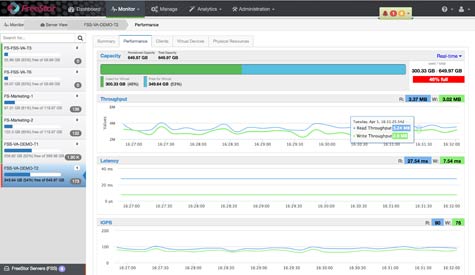For the past year, FalconStor Software has been working on reinventing itself into a provider of a layer of FreeStor storage virtualization software that enables IT organizations to manage heterogeneous storage. Starting today, FalconStor Software is now applying predictive analytics to those heterogeneous storage systems.
Tim Sheets, vice president of corporate marketing and enablement for FalconStor Software, says thanks to the rise of software-defined storage, the days when storage systems were managed in isolation are all but over. Modern IT organizations want to be able to holistically manage all their storage assets regardless of which vendor provided them, says Sheets.
Sheets says FreeStor, designed to work with storage systems running on premise or in the cloud, now provides unified analytics at both global and granular levels. IT administrators can define views, reports and smart rules as they see fit, which they can access via a graphical user interface or using an Apple iOS or Google Android smartphone. In addition, a set of REST application programming interfaces (APIs) makes it possible to share storage analytics data with third-party applications.
Arguably, storage is one of the primary reasons many IT organizations are challenged when it comes to building a private cloud. For more years than anyone cares to remember, storage systems have been dedicated to specific applications. In a private cloud, all those storage resources become part of a much larger virtual pool through which it becomes easier to share data across multiple applications.
Of course, before making all the storage available as a shared resource, most IT organizations are going to want to know what’s actually occurring on each storage system. Otherwise, each application owner in the enterprise is going to be that much less likely to want to give up a dedicated storage resource unless someone in the IT department can unequivocally guarantee them that the performance of those applications will not be compromised.




